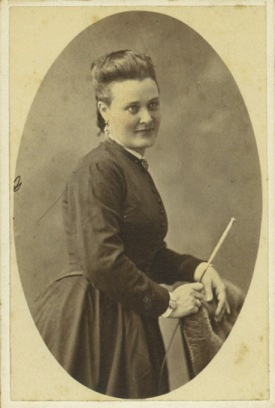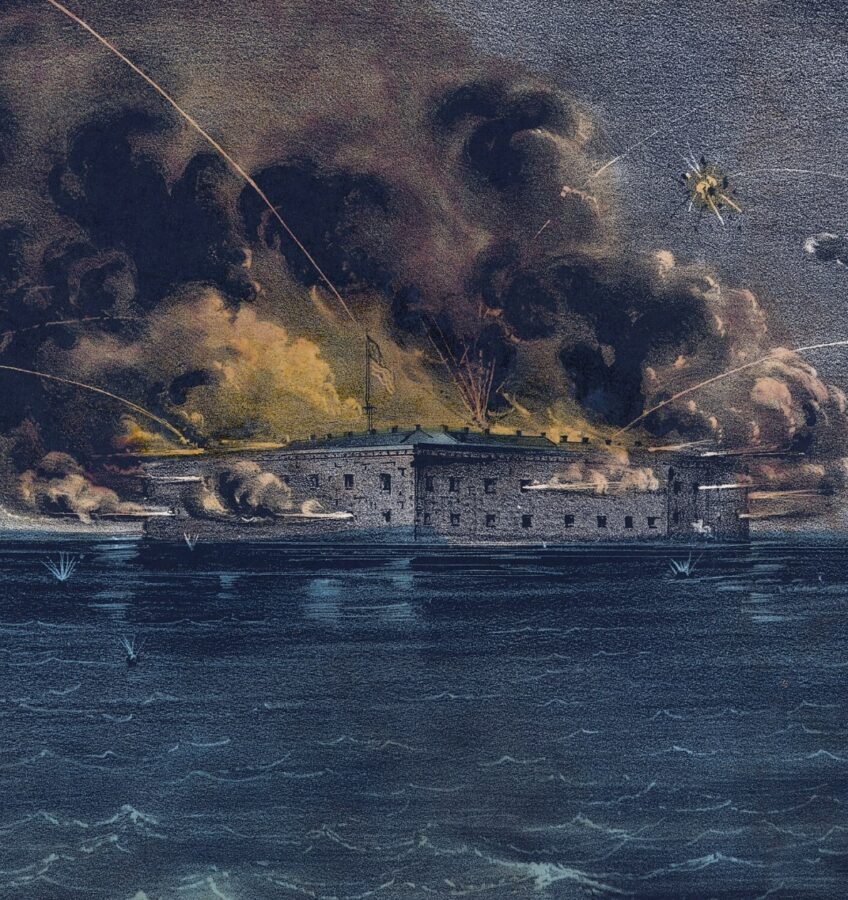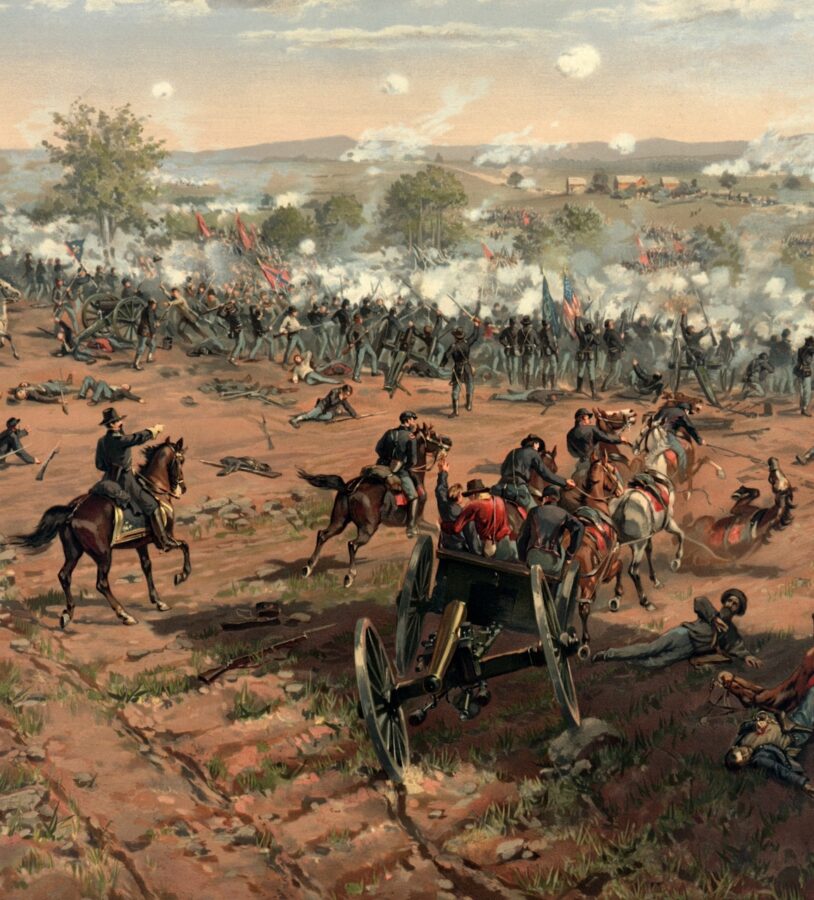In 1864, 25-year-old Maryland native Laura Catherine Redden published her first book of poetry, Idyls of Battle, and Poems of the Rebellion. Redden, who had lost her hearing at age 11 after a bout with spinal meningitis, had established herself as a published author in the late 1850s, when she had a number of her poems printed in publications such as Harper’s Magazine. In 1860, when she began working as an editorialist for the newspaper St. Louis Republican, Redden wrote under the pseudonym Howard Glyndon, which also accompanied the poems she published during the Civil War in various newspapers. (In Idyls of Battle, Redden’s name appears under her pseudonym in parentheses.) Redden continued her journalistic career after the war, working for publications including The New York Times and the New York Evening Mail. She married Edward Searing, a man 18 years her junior, in 1876; they had a daughter in 1880. Laura Redden Searing died in 1923 at age 84. Below is a sampling of her wartime poems.
 Ellis Library, University of Missouri
Ellis Library, University of MissouriLaura C. Redden, aka Howard Glyndon, circa 1871
LEFT ON THE BATTLE-FIELD.
Oh, my darling! my darling! never to feel
Your hand going over my hair!
Never to lie in your arms again, —
Never to know where you are!
Oh, the weary miles that stretch between
My feet and the battle-ground,
Where all that is left of my dearest hope
Lies under some yellow mound!
It is but little I might have done
To lighten your parting pain;
But ’t is bitter to think that you died alone
Out in the dark and the rain!
Oh, my hero love! — to have kissed the pain
And the mist from your fading eyes!
To have saved one only passionate look
To sweeten these memories!
And thinking of all, I am strangely stunned,
And cannot believe you dead.
You loved me, dear! And I loved you, dear!
And your letter lies there, unread!
You are not dead! You are not dead!
God never could will it so —
To craze my brain and break my heart
And shatter my life — I know!
Dead! dead! and never a word,
Never a look for me!
Dead! dead! and our marriage-day
Never on earth to be!
I am left alone, and the world is changed,
So dress me in bridal white,
And lay me away in some quiet place
Out of the hateful light.
THE STORY OF SUMTER.
 Library of Congress
Library of CongressThe attack on Fort Sumter in 18612
THEN.
Over sea and over city slowly crept the sullen morn,
All the splendor of its dawning by a growing shadow curst;
And the sunless sky that sphered us nursed a tempest yet unborn,
But we waited on the Battery [on Charleston Harbor] for another storm to burst.
Grim, defiant, as some olden warrior clad in chilly mail,
Sullen, signless silence brooding o’er its weather-beaten face,
From its brow the vapor rifted by the freshening eastern gale,
Saw we Sumter, as the grayness of the morning waned apace.
Ha! the sluggish day is shaken from its stillness by a growl,
The defiance of the Southron — spoken from the cannon’s mouth
Blazes out the fiery ruin from beneath its smoky cowl,
And within the walls of Sumter falls the gauntlet of the South!
No response unto the challenge! Are they powerless to defy?
But what flutters from the ramparts as the vapor parts away?
Still their own insulted colors o’er the dauntless heroes fly,
Flaunting all their braided splendors in the sullen face of day!
Ah! behind those silent bulwarks, rising, grimly from the sea,
Waiting for the stealthy coming of the death-dispensing shell,
There’s a band of fearless spirits; guess how many strong they be,
They who stood so long and bravely, ere their glorious banner fell!
Seventy men to man the ramparts and to work each giant gun!
Only these to face the Southrons, who are seven thousand strong!
Bravely toiled they from the dawning to the setting of the sun, —
Bursting shell and shot around them in a ceaseless fiery throng!
Fast and faster belched the ruin from the sulphurous, yawning jaws
Of the seven Southern batteries, armed and ready for the work;
All the day and all the night long well were plied their greedy maws,
And until the second morning broke disconsolate and murk.
Fire within and foes without them I Yet they struggled long and well,
From beneath their blazing shelter holding out against a host,
Ere the colors of the loyal from the crest of Sumter fell,
And the gallant Seventy slowly left their well-defended post!
April, 1861.
NOW.
Now the tender budding greenery brightens all the earth again,
But the sprouting grass is reddened with the angry bloom of war!
By the hearthstones of the nation only sounds the wail of pain,
While our hero soldiers struggle in the glorious fight afar.
Thy Nemesis, O Sumter! was the thrill that shook the land;
When the tidings of thy spoiling brought the nation to its feet,
Then was clenched, with stern intention, injured Loyalty’s right hand;
Its insulted front was lifted proudly up the taunt to meet!
Murmur not in doubt, my brothers, at this trial rite of blood, —
At this purging out of error from the arteries of the land!
Never yet the walls of Treason the assault of Right withstood;
Ere another year hath circled ye shall prove it where ye stand!
April, 1864.
THE BATTLE OF GETTYSBURG.
The days of June were nearly done;
The fields, with plenty overrun,
Were ripening ’neath the harvest sun,
In fruitful Pennsylvania.
Sang birds and children, “All is well!”
When, sudden, over hill and dell,
The gloom of coming battle fell
On peaceful Pennsylvania!
Through Maryland’s historic land,
With boastful tongue and spoiling hand,
They burst — a fierce and famished band —
Right into Pennsylvania!
 Library of Congress
Library of CongressThe Battle of Gettysburg
In Cumberland’s romantic vale
Was heard the plundered farmer’s wail;
And every mother’s cheek was pale,
In blooming Pennsylvania!
With taunt and jeer, and shout and song,
Through rustic towns they passed along,
A confident and braggart throng,
Through frightened Pennsylvania!
The tidings startled hill and glen;
Up sprang our hardy Northern men,
And there was speedy travel then,
All into Pennsylvania!
The foe laughed out in open scorn,
For Union men were coward-born!
And then — they wanted all the corn
That grew in Pennsylvania!
*******
It was the languid hour of noon,
When all the birds were out of tune,
And Nature in a sultry swoon,
In pleasant Pennsylvania, —
When, sudden o’er the slumbering plain,
Red flashed the battle’s fiery rain,
The volleying cannon shook again
The hills of Pennsylvania!
Beneath that curse of iron hail,
That threshed the plain with flashing flail.
Well might the stoutest soldier quail
In echoing Pennsylvania!
Then, like a sudden summer rain,
Storm-driven o’er the darkened plain,
They burst upon our ranks amain,
In startled Pennsylvania!
We felt the old, ancestral thrill,
From sire to son transmitted still,
And fought for Freedom with a will,
In pleasant Pennsylvania!
The breathless shock, — the maddened toil, —
The sudden clinch, — the sharp recoil, —
And we were masters of the soil,
In bloody Pennsylvania !
To westward fell the beaten foe;
The growl of battle, hoarse and low,
Was heard anon, but dying slow,
In ransomed Pennsylvania!
Sou’westward, with the sinking sun,
The cloud of battle, dense and dun,
Flashed into fire, — and all was won
In joyful Pennsylvania!
But ah, the heaps of loyal slain!
The bloody toil I the bitter pain!
For those who shall not stand again
In pleasant Pennsylvania!
Back through the verdant valley lands,
Fast fled the foe, in frightened bands,
With broken swords and empty hands.
Out of Pennsylvania!

